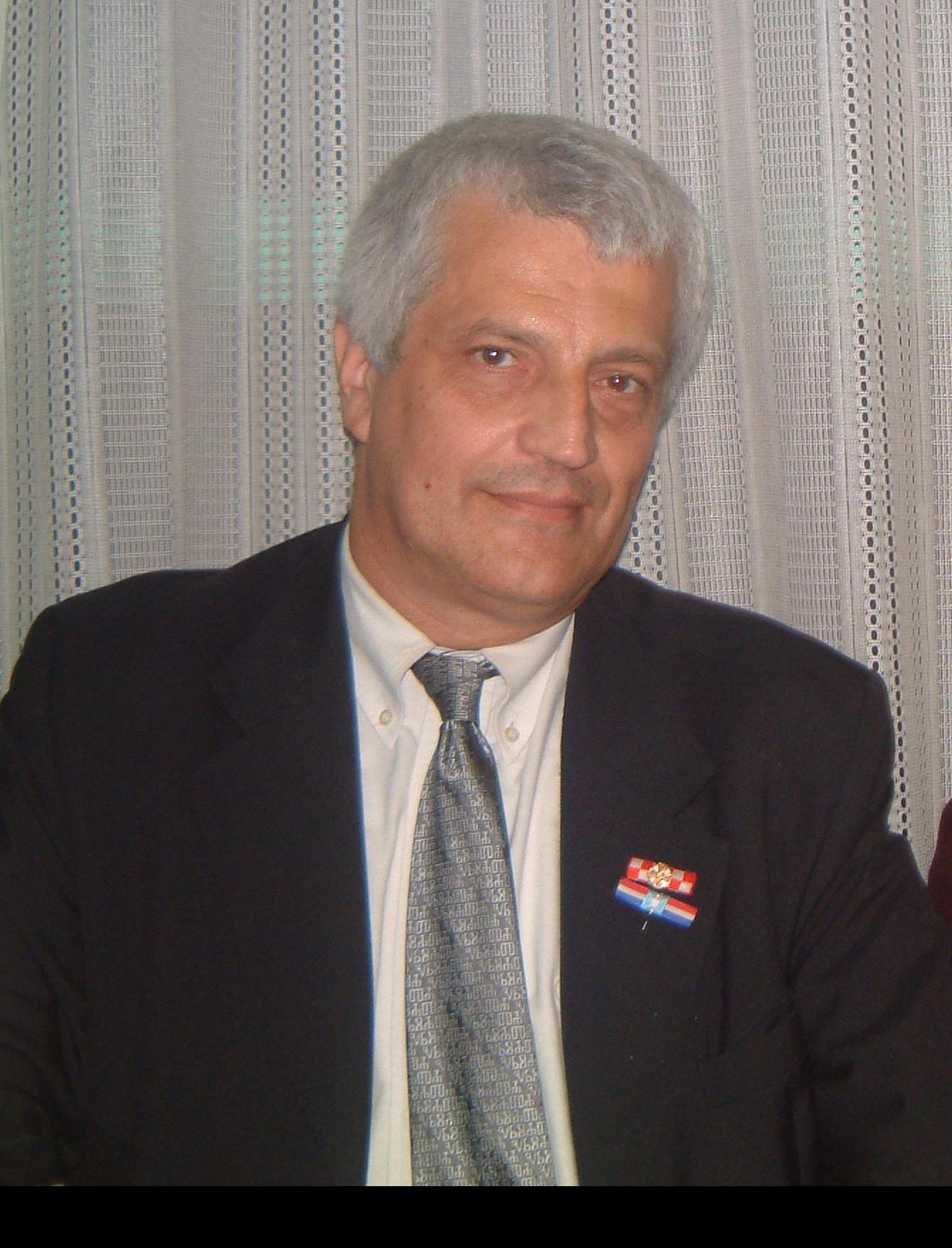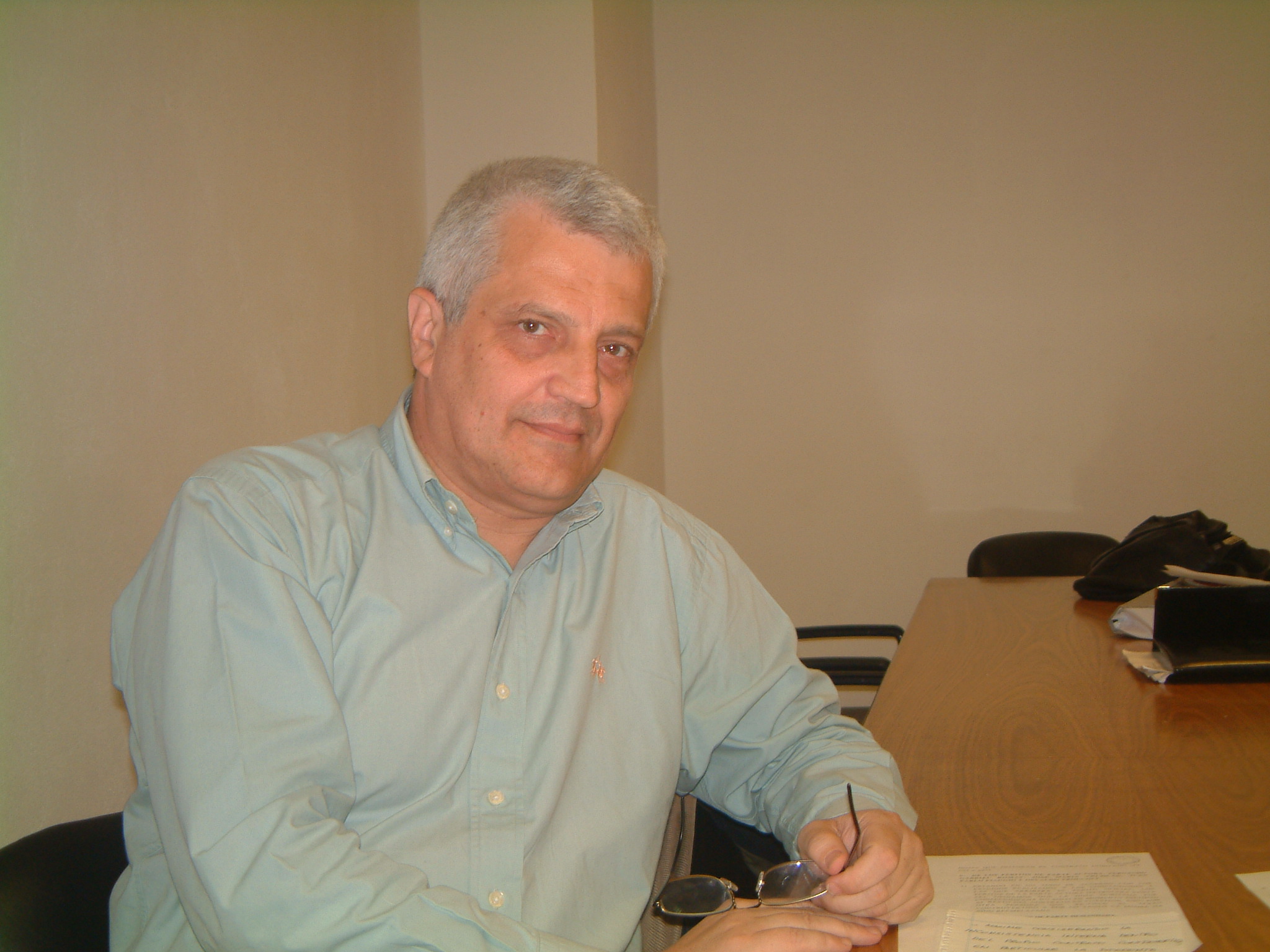|
JozaVrljičak 
POVIJEST I AKTUALNOSTREVIJE STUDIA CROATICA StudiaCroatica već 43 godine izlazi u Buenos Airesu i do sada je na španjolskomjeziku objavila tisuće stranica o hrvatskoj književnosti, povijesti,kulturi i politici. Uredništvo, kojem je na čelu neumorni Joza Vrljičak,izdaje tradicionalna izdanja na papiru, te elektronička izdanja na CD-ROM iInternet. Godine 1959 u vrlo neizvjesnoj međunarodnoj situacijijedna skupina hrvatskih intelektualaca državotvornih političkih emigranatau Buenos Airesu, Republika Argentina, odlučuje promijeniti svoju dotadašnjupolitičku djelatnost prema unutra i okrenuti je prema vani, prema svijetukoji nas okružuje. U tom krugu hrvatskih nacionalista počela je sazrijevatispoznaja o potrebi glasila koje bi se na jednom svjetskom jeziku suprotstavilobrojnim srbokomunističkim dezinformacijama i promicala autentičnusliku o hrvatskom narodu, njegovom povijesti, kulturi i legitimnim težnjama daživi u vlastitoj nezavisnoj državi. Inicijativom g. Ive Rojnice počeli su se sastajati uuredu doktora Radovana Latkovića. Nakon temeljitoga ispitivanja mogućnosti,odlučili su pokrenuti tromjesečnu reviju na španjolskom jeziku,najpogodnijem s obzirom na svoje boravište i na okolnost, da španjolski jeziknije samo jezik Argentine i velikoga dijela Južne Amerike, nego i jedan od raširenihsvjetskih jezika preko kojega bi mogli postići zacrtani cilj. Izabrano ime, StudiaCroatica, imalo je označiti izdavački program koji bi, nadilazećipolitičku propagandu, stručno i dokumentarno obradivaopovijesno-političke, kulturne, socijalne i ekonomske aspekte Hrvatske ihrvatskoga naroda. Ujedno, bilo je odlučeno iosnivanje jedne hrvatske kulturne ustanove, koja će biti ujedno ipokrovitelj časopisa, Hrvatskoga-LatinoameričkogaKulturnoga Instituta (Instituto Croata-Latinoamericano de Cultura) kaopokrovitelja revije. Prvipredsjednik Instituta bio je dr. BožidarLatković. Financijsko pitanje bilo je brzo riješeno, s obzirom da suurednici i pisci radili bez ikakve naplate, ad honores, a troškove tiskare iodpreme časopisa preuzeo je g. Ivo Rojnica i djelomično, u početku,i dr. Mate Luketa. G. Rojnica nastavio je i nadalje,ne samo svojim novčanim doprinosima, nego je i kao osnivač i članprvoga i slijedećih uredničkih odbora, djelotvorno sudjelovao u raduRevije i Instituta. Dao je, također, naraspolaganje obadvjema ustanovama uredske prostorije u središtu Buenos Airesa(u ulici Carlos Pellegrini 743, treći kat). Naknadno se je priključiopomaganju Revije SC i g. Miro Kovačić i još neki sporadičnidoprinosnici. Osnivači revije ustrojili su ujedno i prvi uredničkiodbor, sastavljen od slijedećih osoba (abecednim redom): dr. AnđelkoBelić, dr. Milan Blažeković, Ivo Bogdan, dr. Ivo Hühn, Branko Kadić,Srećko Karaman, braća dr. Božidar i dr. Radovan Latković, dr.Mate Luketa, dr. Franjo Nevistić, prof. Vinko Nikolić, Ivo Rojnica,dr. Pero Vukota i naknadno, prof. Daniel Crljen, Milan Rakovac i LjeposlavPerinić. Prvi glavni urednik bio je IvoBogdan, poznati hrvatski publicist, a prvi tajnik uredništva Branko Kadić,koji je ujedno bio i prevoditelj, jer je dobro vladao španjolskim jezikom kaonovinar koji je za vrijeme Nezavisne Države Hrvatske bio dopisnik"Hrvatskoga naroda" u Madridu. U mjesecu rujnu 1960 godinepojavio se je prvi svezak tromjesečnika StudiaCroatica na 96 stranica u čijem uvodniku je bilo istaknuto slijedeće: "Ova je publikacijanamijenjena javnom mnijenju iberoameričkih zemalja, a posebice onima, kojise radi svojega poziva ili svoje dužnosti bave proučavanjem stanja kojevlada u Srednjoj i Južnoj Europi, područjima sada podvrgnutim komunističkomnasilju. Ova publikacija predstavlja autentični izraz prognanih Hrvata, međukojima se nalazi ne maleni broj intelektualaca, žrtava komunističkihprogona. Želja je inicijatora ove publikacije, da obavijesti slobodni svijet opovijesno-kulturnoj baštini svoje stare domovine, o njezinim patnjama,zbivanjima i borbi koju vodi za slobodu i nezavisnost. U isto vrijemeinicijatore potiće i osjećaj zahvalnosti prema američkimrepublikama u kojima su našli svoju novu gostoljubivu domovinu." Osim redovitog izlaženja revije StudiaCroatica, Hrvatsko-Latinoamerički Kulturni Institut i uredništvo StudijeCroatice su objavili na španjolskom jeziku još i sljedeće tematskepublikacije, odnosno prave knjige: Bleiburškatragedija - Dokumenti o masovnom ubijanju Hrvata u komunističkojJugoslaviji godine 1945. (na400 stranica), Bosna i Hercegovina - Doprinosi za osvjetljavanje uzroka Prvogsvjetskog rata (na 344 stranice), Hrvatskai sadašnja kriza u Jugoslaviji (publikaciju je napisao dr. Franjo Nevistić,a izdana je za vrijeme hrvatskog proljeća 1971. godine), Hrvatska i njezinasudbina (izdana 1977. godine), Poljičkistatut (knjiga izdana godine 1995., koju je preveo na španjolski jezik ikomentirao dr. Božidar Latković), DubrovačkiStatut – Sedma knjiga, koju je isto tako preveo i komentiraodr. Božidar Latković. Urednički odbor sastajao se je svake srijede,analizirajući političke događaje i suradnju za slijedećibroj revije. "Ne zaboravan mi je sklad i prijateljsko osjećanje kojeje vladalo u tom krugu ´u srijedu´. Podsjeća me na vrijeme, koje sam doživiou pododborima Matice Hrvatske u domovini", piše Radovan Latković usvojoj knjigi Živjeli smo i borili se za Hrvatsku, (Naklada Jurčić,Zagreb, 2001), Krug ljudi oko revije StudiaCroatica i Instituta postao jeprimjer hrvatskoga nacionalnoga zajedništva, koje već prvih godinaemigracije osjećao kao temeljnu potrebu učinkovitoga hrvatskoga političkogadjelovanja. Prvibroj Studia Croatica objavljen je zatromjesečje srpanj-rujan 1960., godine mučeničke smrti KardinalaStepinca. Broj je posvećen herojskom liku zagrebačkoga Nadbiskupa sdva priloga uglednih inozemnih pisaca, Francuza Ernest-a Pezet-a i ArgentincaMartin-a Aberg-a Cobo, uz političku razčlanbu glavnoga urednika IveBogdana. Odposebnoga značenja bilo je izdanje cijeloga godišta 1963., na 390 stranicau obliku knjige pod naslovom La Tragediade Bleiburg – Bleiburška tragedija, s obsežnim povijesno-političkimanalizama događaja koji su predhodili ovoj tragediji i dokumentima zločinapočinjenih u Bleiburgu i na "putovima smrti". Potrebnoje istaknuti, da je to bila prva dokumentarna knjiga o kolektivnom pokoljuHrvata u komunističkoj Jugoslaviji 1945. na jednom stranom jeziku, španjolskom,sa sažetcima na španjolskom, njemačkom, francuskom, engleskom ihrvatskom. Zanimljivoje spomenuti, da je naslov ove knjige, LaTragedia de Bleiburg – Bleiburška tragedija - bio prihvaćen naknadnou hrvatskoj publicistici kao opći naziv tih tragičnih događajasvibnja 1945. Drugovažno izdanje predstavljaju četiri broja SC godine 1965., objavljena kaoknjiga na 344 stranica pod naslovom Bosniay Herzegovina - Aportes al esclarecimiento del origen de la Primera GuerraMundial (Bosna i Hercegovina – Prilozi za objašnjenje uzroka Prvogasvjetskoga rata), povodom pedesete godišnjice atentata u Sarajevu naaustrijskoga prijestoljonasljednika Franju Ferdinanda i njegovu suprugu Sofiju(1914.- 1964.). Knjigaobuhvaća tri velike studije: PitanjeBosne i Prvi svjetski rat Ive Bogdana; Bosnai Hercegovina - hrvatske pokrajine o. Dominika Mandića (s opsežnim sažetkomna engleskom) i Politička povijestBosne Pere Vukote, uz radove Franje Nevistića, Milana Blažekovićai jednoga suradnika iz Hrvatske pod pseudonimom (J. G. Fratija). U okviru tematske raspodjele StudiaCroatica je objavljivala i sve djelatnosti Hrvatskog-Latinoameričkog Kulturnog Instituta, kao i njegova sudjelovanja, naprimjer, na Svehrvatskom kongresu u New Yorku 1962. godine i u Hrvatskomnarodnom vijeću od 1975. godine do obnove suvremene hrvatske države. Institut je osim istraživanja Bleiburške tragedije istraživao isudbinu američkih zrakoplovaca zarobljenih u NDH za vrijeme rata 1941-1945godine. Rezultati toga istraživanja potakli su američkog povjesnicaraMichaela McAdamsa da istraživanje dovrši i 1980 godine objavi knjigu podnaslovom Allied Prisoners of War inCroatia 1941 - 1945, koja je poslužila hrvatskim državnim vlastima u svomodnosu sa Sjedinjenim Američkim Državama. Nedugo iza ovih prvih uspjeha StudiaCroatica je doživjela teški udarac, smrt Ive Bogdana, uzrokovane okrutnimatentatom agenata Ozne 1971. u Buenos Airesu. Alinisu se dali pokolebati. Glavno uredništvo preuzeo je dr.Franjo Nevistić, a nakon njegove neočekivane prerane smrti, 1984., bioizabran dr. Radovan Latković za glavnoga urednika Studia-eCroatica-e i predsjednika Hrvatskoga-LatinoameričkogaKulturnoga Instituta, dužnosti koje vršio do kraja 1994. Istodobno, došlo je i dopromjene tajnika uredništva. Za novoga tajnika bio izabran Ljeposlav Perinić,koji je vrlo učinkovito obavljao tu dužnost također do kraja 1994. Kao glavni urednik, dr RadovanLatković uspio je proširiti krug suradnika i s piscima iz Domovine (DubravkoHorvatić i drugi). Napose je bila zapažena suradnja dra. Franje Tuđmana,esej "Stjepan Radić i hrvatska povijest" (SC 1988., vol. 4, S.291.), suradnja za koju je osobno dobio privolu prigodom susreta s drom Tuđmanomu Torontu. Povodom 33. obljetnice neprekinutoga objavljivanja revije StudiaCroatica, objavilo se izvanredni svezak s raznim podatcima o djelovanjurevije tijekom toga razdoblja. Prema ustanovljenim podatcima, u razdoblju 1960.-1992. proširilose preko revije poznavanje hrvatske kulturne baštine i težnje hrvatskoganaroda za samoodređenjem u neovisnoj suverenoj državi besplatnim slanjem Studia-eCroatica-e na 134 ustanova (sveučilišta, knjižnice) po kojima jerevija postala pristupačnom širokom krugu čitatelja u 37 država: Argentina, Australija, Austrija, Belgija, Bolivija,Bosna-Hercegovina, Brazil, Bugarska, Costa Rica, Čile, Ekvador, Engleska,Francuska, Guatemala, Honduras, Hrvatska, Izrael, Italija, Japan, Kanada,Kolombia, Mađarska, Mexico, Njemačka, Paraguay, Peru, Portugal, PuertoRico, Rumunjska, Rusija, Santo Domingo, Sjeverne Američke Države, Španjolska,Švedska, Švicarska, Urugvaj, Venezuela. Šestero južnoameričkih predsjednika, koji su sa svojimpristankom primali Studiju Croaticu, među prvima su priznali RepublikuHrvatsku. Kako je već spomenuto, prva tri glavna urednika Studia-eCroatica-e bili su Ivo Bogdan, dr. Franjo Nevistić i dr. RadovanLatković. Koncem godine 1994 uredništvo preuzimlje magisterJoza Vrljičak, a u uredničkom odboru se nalaze escribanaJasna Bulat, Mira Dugački, dr. Maja Lukač-Stier, dr. Silvio Rajman, inž.Ante Turica, dr. Marija Vrljičak-Sutter, lic. Carmen Vrljičak, dr. IvaVidić i dr. Jadranka Smajić, a dopisnici su dr. Mateo MartinićBeroš (Chile), Ksenija Horvat (Venezuela), dr. Vinko Grubišic (Kanada), dr.Francisco Javier Juez Galvez (Španjolska), te magisterMate Marčinko, dr. Vladimir Dugački, prof. Domagoj Ante Petrić,Darko Mažuranić (Hrvatska) i prof. Christophe Dolbeau (Francuska). Krug čitatelja Studia-eCroatica-e se znatno proširio i internacionalizirao, uključenjem Studia-eCroatica-e u Internet (http://www.studiacroatica.com), što je ostvario aktualni glavni urednik u prosincu 1996. Studia Croaticaima na svom Web site 60.0 Megabytes (to znači 60.000.000 slova i to jenajveći Hrvatski Web site na hrvatskoj dijaspori. Ima nekih 6.000 stranica revije (polovica od onih koji su seizdale kroz ovih 43 godine), plus nekih 2.000 stranica s raznim knjiga na španjolskom,engleskom, francuskom, i hrvatskom. Naj noviji material što se jestavio na Internet je Sveto Pismo na hrvatskom (prijevod od Tomislav-a Dretar-a) Mjesečnose čitaju oko 100.000 stranica, tako da StudiaCroatica je danas jednog od najčitanijih hrvatskih časopisa naInternetu. Web site dobiva posjeta od svih zemalja na svjetu, a naj ceščijeposijetitelji su iz Španjolske, Meksika, Argentine, Hrvatske, Chile i Kolombia. God.2000, povodom 40. obljetnice neprekinutoga objavljivanja revije Studia Croatica, objavio se je jedan CD-ROM sa materialom koje tegodine se je već bio stavio na elektroničku formu. Dodanas je izdano na papiru145 brojeva revije StudiaCroatica na više od 12.000 stranica. Zavrijeme sadašnje redakcije broj onih osoba i Institucija, koji besplatnoprimaju Studia-u Croatica-u krećese oko 500. Tu su Narodne i Sveučilišne Biblioteke, diplomati, novinari,znantvenici i ugledne osobe. Upravonaj noviji broj revije je posvečen Marku Maruliću. Najnoviji "španjolskiMarulić" pojavio se zahvaljujući istaknutom španjolskom klasičnomfilologu, slavistu i kroatistu, profesoru na Komplutskom Sveučilištu uMadridu, Francisco-u Javier-u Juez-u Galvez-u, jedan od najpoznatijih marulologaizvan Hrvatske, te argentinskom nakladniku da bi pripremio "ediciónespecial" buenosaireskoga časopisa, Galvez je preuzeo višestruke zadaćeurednika, priređivača, autora i prevoditelja s drevne Marulićevečakavice, s njegova humanističkoga latinskog i mletačkogatalijanskog i francuskog jezika. Mnogičestitaju Reviji, pa i sam Nadvojvoda dr Otto von Habsburg čestitao Studia-u Croatica-u i pokazuje svoju ljubav za Hrvatsku. Znakovitoje, da Studia Croatica nije samo važnosredstvo informiranja međunarodne zajednice, nego da obavlja važnuinformativnu djelatnost i unutar one generacije hrvatskih emigranata Argentine,Chile-a i Latinske Amerike općenito, koja slabo, ili nikako, poznajehrvatski, pa im je poznavanje hrvatske povijesti, kulture i nacionalnih težnjahrvatskoga naroda postalo pristupnim tek preko revije StudiaCroatica, na španjolskom jeziku. Časopisodigra važnu ulogu u životu Hrvata na južnoameričkom kontinentu. Samomčinjenicom da izlazi na jednom od svjetskih jezika njegovo se značenjeproširilo i na ostali dio svijeta. Tome su pridonijeli i kvalitetni prilozi izpera hrvatskih intelektualaca koji su se poslije 1945. zatekli u svojevrsnojmetropoli hrvatske političke emigracije Buenos Airesu. Argentinski Hrvat Joza Vrljičak (Buenos Aires, 1947) jeekonomski stručnjak, prevoditelj i dobro pozna informatiku. Čestoposjećuje Hrvatsku, gdje prijateljuje s nizom intelektualaca i kulturnihdjelatnika. Vrljičak je studirao na Université de Montréal - LoyolaCollege, te Concordia University, u Kanadi. Govori španjolski, hrvatski,engleski I francuski. Potpredsjednik je Međudruštvenog odbora hrvatskihudruga i ustanova u Argentini. Vlada Republike Hrvatske odlikovala ga je Redomhrvatskog pletera. Vrljičak dobro poznaje povijest i aktualnost hrvatskezajednice u Argentini i sudijeluje u raznim hrvatskim udrugama. 
Joza Vrljičak - Our Croatian Pride (op -ed)
|